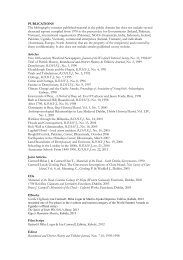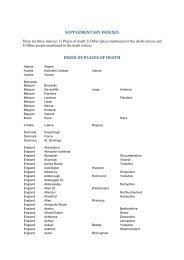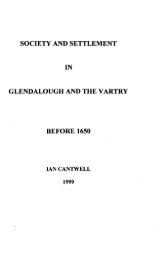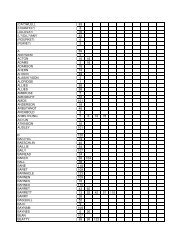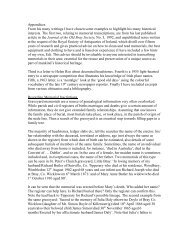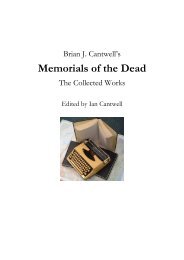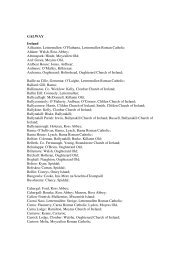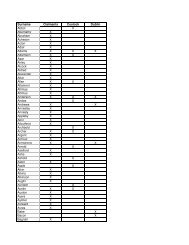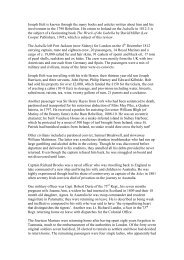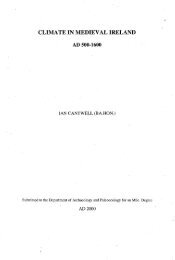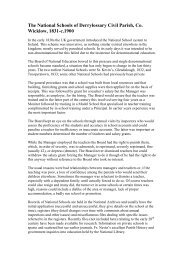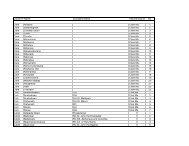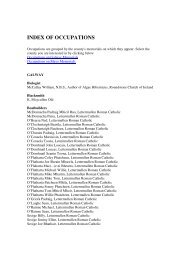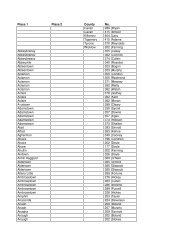Bibliography of Kigezi Sources - Ian Cantwell
Bibliography of Kigezi Sources - Ian Cantwell
Bibliography of Kigezi Sources - Ian Cantwell
Create successful ePaper yourself
Turn your PDF publications into a flip-book with our unique Google optimized e-Paper software.
Some articles are available on the internet and are either free or by subscription only.<br />
Copying the title into a search engine is the fastest way to establish e-publication. Note that<br />
some articles are available on both open source and fee-paying sites; there's no need to spend<br />
money when you don't have to. Development-related works are freely and easily available.<br />
Online coverage <strong>of</strong> older works is patchy.<br />
Recent scientific journals, and the like, are mixed, depending on contracts with internet<br />
publishers. For the debate concerning open access versus subscription in the following 18th<br />
century Irish joke may be pertinent (Spirit <strong>of</strong> Irish Wit, London, 1811):<br />
“Mr. Burke, author <strong>of</strong> the Sublime and Beautiful, going to a bookcase, and finding it locked, said,<br />
“This is a Locke on the Human Understanding”.<br />
For non-academic websites – a word <strong>of</strong> warning – they tend to quote each other word for<br />
word without acknowledgement and it can be difficult to establish the original source or their<br />
credibility.<br />
A Short History <strong>of</strong> <strong>Sources</strong><br />
The bibliography shows that in the period after independence intellectual curiosity was still<br />
strong following the English and European university tradition, particularly in Makerere<br />
University, originally East African University. However Idi Amin's hatred <strong>of</strong> and subsequent<br />
pogroms against those he perceived as 'intellectuals' brought original research and publishing<br />
to a sudden halt in most academic disciplines. Then the harsh world <strong>of</strong> economic reality set in<br />
and the function <strong>of</strong> books is now mostly utilitarian; to get a job, ideally with a degree, and<br />
sometimes books have to be used for work.<br />
One possible interpretation is that books as a source <strong>of</strong> reading pleasure or to satisfy curiosity<br />
has become less common with less personal investment in knowledge for long-term personal<br />
development. Book costs are another inhibiting factor as the price may equal a week's wages.<br />
According to James Tumusiime (Chairman and MD <strong>of</strong> Fountain Publishers), 2000:<br />
“Moreover those bad times killed the book-reading habit as many teachers resorted to stencilling<br />
or photocopying occasional pages and some used past examination papers to teach from. There<br />
were children who came out <strong>of</strong> primary school never having handled a book.”<br />
A review <strong>of</strong> the publications shows that the golden age <strong>of</strong> history was in the late 1960s and<br />
early 1970s when there were many significant publications <strong>of</strong> books and in journals. The<br />
majority (24) <strong>of</strong> theses and dissertations in Makerere University were published between<br />
1968 and 1976, peaking between 1969 and 1973.<br />
Between 1981 and 1992 a further five were published that are cultural, and contain some<br />
historical background, except for one that is a diocesan history. Another was published in<br />
1994 and, since then, silence. This is mirrored in the Uganda Journal who has published<br />
many articles on <strong>Kigezi</strong>, history, development and natural sciences since 1934, the last was in<br />
1982.<br />
Two major exceptions are Festo Karwemera who has published many books on Bakiga<br />
culture, language and history in Rukiga and Bishop Ernest Shalita who published similar<br />
topics in Bafumbira in Rufumbira with two in English.



